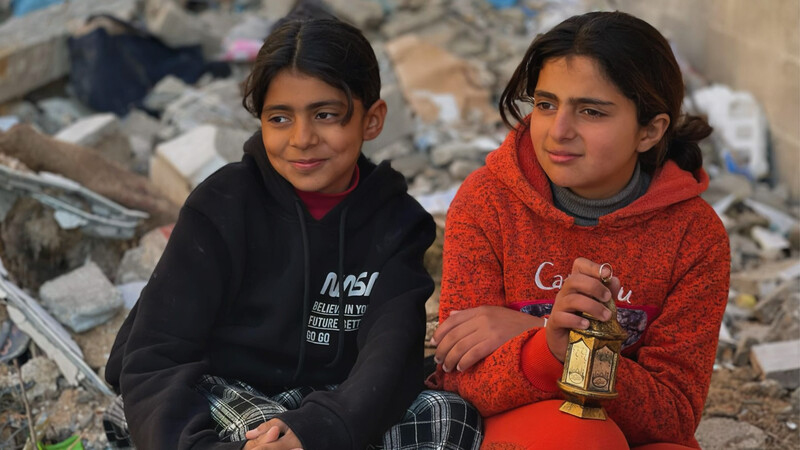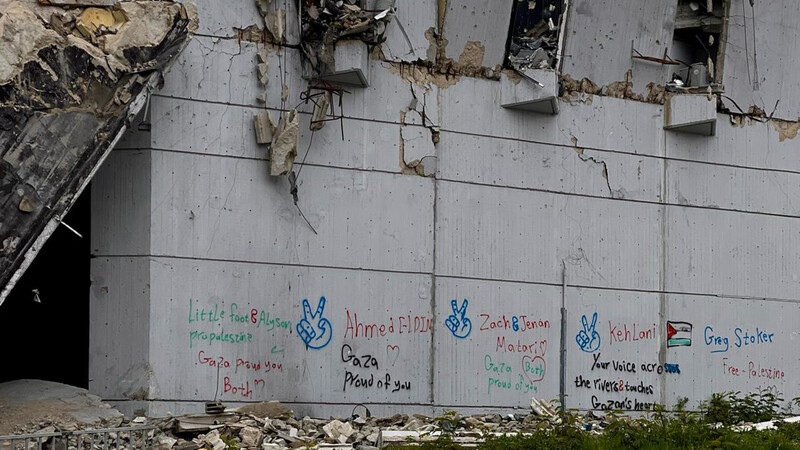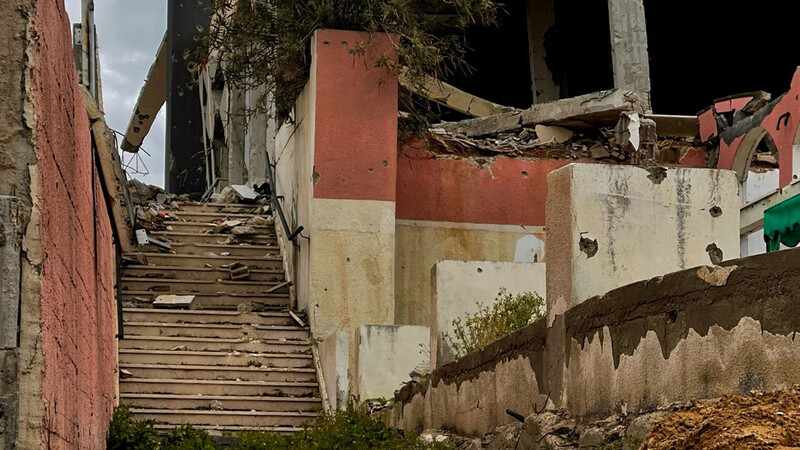The Electronic Intifada 19 May 2025

The author’s sister and her friend during Ramadan in Gaza City, March 2024.
In this war when I am bored I go to sleep.
But then I wake up around dawn to a bombardment and I am no longer bored. The explosions are so close that I go deaf for a few minutes, only able to hear a buzz in my ear that spreads all the way to my brain.
In these moments after a bombardment I pass through three stages.
The first is the silent and frightened stare. I am stunned. I stand up only to sit down again because my legs can no longer carry the weight of my body. I try to process what is happening, but the conscious mind is protective and doesn’t want me to pry further.
The next stage brings out another coping mechanism: making light of the situation with humor. What a surprise that bombardment was. If my little sister is in the room, we’ll say that the explosion was a balloon popping or a car tire.
Other times we pretend that the bombardment is no big deal at all.
The last is forgetting. I pretend it didn’t happen and I go on, unfazed.
Mshahar
Most days, I live in a state of mshahar.
Mshahar is a word in Palestinian dialect, specific to Gaza, that means miserable or terribly unlucky. It’s the feeling that bad luck is chasing you all the time. My mom keeps saying that we’re a mshahar generation – we were born when life was collapsing. It describes Palestinians perfectly because war and agony never fail to leave us alone.
Israel broke the ceasefire in mid-March and the war was back, though it was never really over – over a hundred people were killed by Israeli attacks during the “ceasefire,” and the drones never went away.

Graffiti on a building in Gaza City, during one of the author’s many evacuations.
But with the breaking of the ceasefire came the torturous sirens, the ground shaking, a return to mshahar. The list of martyrs grew to more than 1,900 in just over a month. It was all happening again.
Israel issued evacuation orders for the al-Mukhabarat area, in Gaza City, where I live with my mother and younger brother. We left for al-Nasser, another area of Gaza City where my uncle lives.
I noticed barely any difference between the two areas. There was mshahar all around. In our area you saw stacked bags and blankets, people carrying their lives in sacks and looking hopeless. In al-Nasser, people were not evacuating but they also looked hopeless, shopping the empty markets.
We returned to our small home in al-Mukhabarat the same day because it was clear we were not going to build a new life again.
Ta’aqlom
Al-Mukhabarat is a wiped-out area. You see more rubble than people. The gray of the rubble even covers up the sky. We’ve tried to create a nice home here, with something other than rubble to look at. We planted flowers and even put out some fake grass that we had found.
This is what we in Gaza call ta’aqlom: adapting in your own way to a difficult situation, living with something and getting used to it. What might be called coping.
Photography is another method of ta’aqlom. It is the one thing that keeps me breathing, sane and alive. Throughout all the evacuations, I’ve taken photos, trying to admire the beauty in each area, despite the destruction. I’ve lived through my lens, choosing what I want to see.
It is my way of ta’aqlom.

A destroyed building in Gaza City, seen during one of the author’s many evacuations.
Gaza City is such a small city. It’s complex and resilient, and its beauty hides in its imperfections. You damn every minute you spend there but miss it the second you leave. But now, you only wish to leave it.
Sometimes I think that the only beauty that is left in Gaza City is the kind that you create in your head, through your own observations. It is a way to make yourself feel slightly better.
I take photos with my phone, a Samsung, and it has helped me see the beauty in Gaza, which, if you train yourself to see it, and to look closely, has no limit.
Yet now the beauty I find is a different kind, an aching kind. It hides in people’s misery, which breaks my heart. It’s the sensation of al-fajaa – tragedy – the unbearable combination of grief and agony.
Nowar Nabil Diab is a writer and photographer in Gaza.





